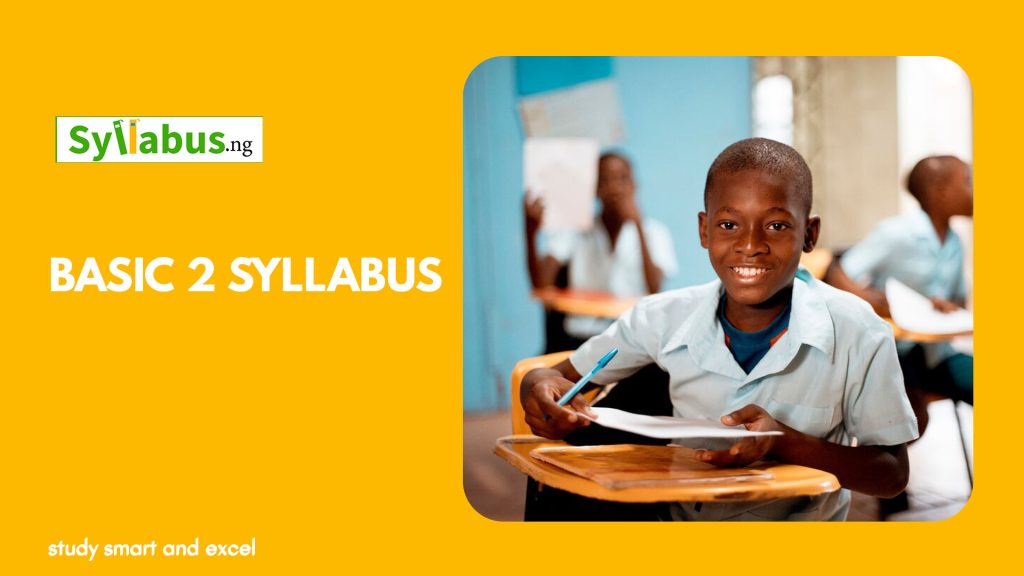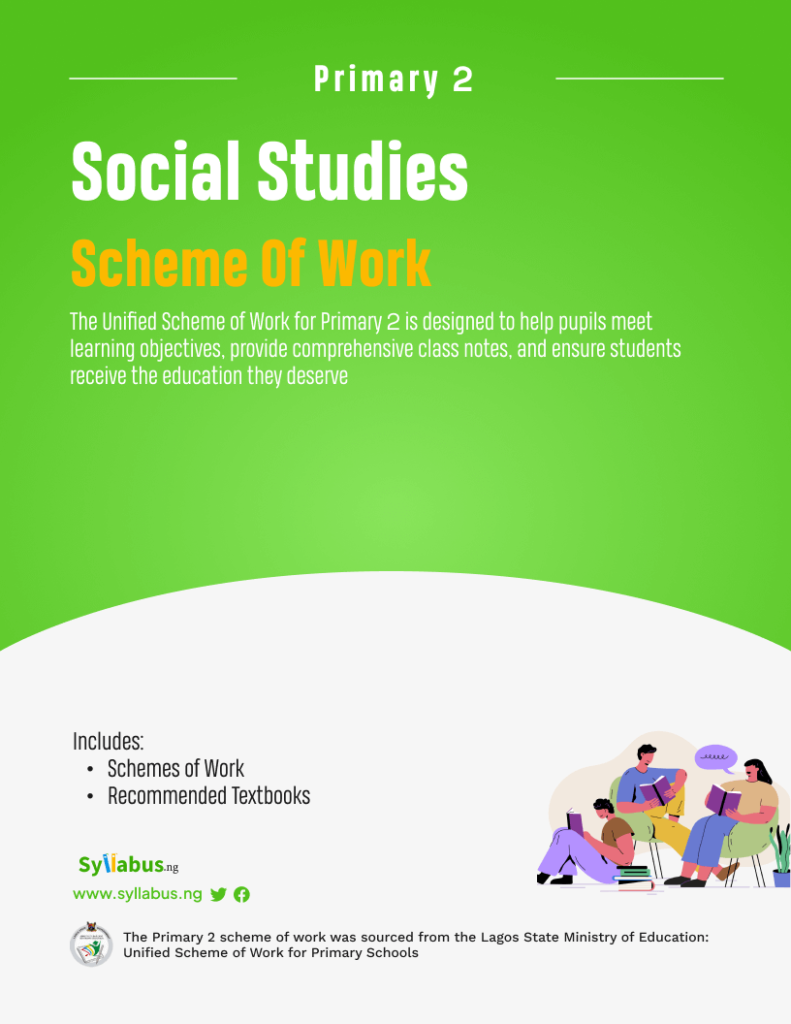Download the Unified Basic 2 Scheme of Work for Social Studies, to serve as a guide for educators and primary school teachers

Home » Primary 2 Scheme of Work » Primary 2 Social Studies Scheme of Work
Social Studies for Primary 2 covers a wide range of topics that are suitable for their age. It is a subject that helps the pupils in understanding our world, including areas like family, community, environment and culture.
The topics that are covered in this class include the meaning and scope of social studies, culture, element of culture, the food we eat, forms of greeting etc. These topics will help them to identify, understand and solve basic issues in their environment.
At the end of this class, the pupils should be able to; know about their physical environment, identify their culture and respect for other people’s culture, identify common foods in our locality and the importance of eating healthy food.

Know what’s expected of you as an educator
Download the Lagos State Unified Scheme of Work for Primary 2 Social Studies
| LAGOS STATE GOVERNMENT MINISTRY OF EDUCATION UNIFIED SCHEMES OF WORK FOR PRIMARY SCHOOLS | ||
| Social Studies Scheme of Work for Primary/Basic 2 | ||
| CLASS | Primary/Basic 2 | |
| SUBJECT | Social Studies | |
| TERM | First Term | |
| WEEK | TOPICS | Learning Objectives |
| 1 | Scope of social studies and meaning of social studies | Pupils should be able to i.define social studies ii. explain the scope of social studies iii.identify the areas of focus of social studies |
| 2 | Culture (meaning) | Pupils should be able to i.Define culture ii. List things that make up a culture iii. Distinguish the culture of the three major tribes in Nigeria |
| 3 | Element of Culture | Pupils should be able to: i.Mention elements of culture ii. Compare the element of culture among the three major cultural group in Nigeria |
| 4 | The importance of culture in Nigeria | Pupils should be able to: i. list and explain the important of culture in Nigeria ii.describe various ways of presenting our culture to Nigeria. iii. mention the effect of foreign on our culture |
| 5 | Food we eat in our family member | By the end of this lesson, pupils should be able to: i. mention types of food eaten among the three major cultural groups in Nigeria. ii.mention similar food we eat together in our cultural group iii. mention the types of food eaten by other culture |
| 6 | Why we eat together | By the end of this lesson, pupils should be able to i. State the reason why people eat together ii. mention effect of eating as a family iii. list different types of food they eat in their family |
| 7 | MID TERM BREAK | |
| 8 | The nutrient in the food we eat and their importance to growth | By the end of this lesson, pupils should be able to i.define nutruent and food ii. mention various nutrient gotten from the food we eat iii. list the six classes of food with examples of food on each class iv. discuss the importance of food to our growth. |
| 9 | Nutient of food we eat(contd) | Pupils should be able to: i. define nutrient and food distinguish between nutrients and food ii. mention the six classes of food iii. describe the importance of food to our growth iv. menüon the nutrient derived from eating a particular food |
| 10 | Revision | Revision |
| CLASS | Primary/Basic 2 | |
| SUBJECTS | Social Studies | |
| TERM | Second Term | |
| WEEK | TOPICS | Learning Obdectices |
| 1 | Revision first term work | Recall most of the last term’s topic and provide answers to the assessment test given |
| 2 | Meaning and importance of greeting | By the end of this lesson, pupils should be able to i. explain the meaning of greeting ii. state the importance of greeting iii. mention people we should greet. |
| 3 | Forms of greeting | Pupils should be ablc to: i. mention forms of greeting e.g kneeling ,prostrating ,bowing, etc ii. identify greeting as a way of showing respect to people iii. Perform various act or forms of greeting in their culture |
| 4 | Meaning and the of environment | Pupils should be able to: i. Explain the meaning of environment ii. State types of environment iii. Mention things found in our environment |
| 5 | Ways of keeping our environment clean | By the end of this lesson, pupils should be able to: i. mention ways of keeping our environment clean ii. list the tools needed to keep our environment clean iii. explain the meaning of sanitation and how often it should be done. |
| 6 | Importance of cleaning in our environment | By the end of this lesson, pupils should be able to: i. mention the importance of cleanliness in our environment ii. mention the effect of dirty environment iii. mention environmental activities to be carried out in our homes and school |
| 7 | MID-TERM BREAK | |
| 8 | Meaning of accidents Causes of accidents at home and school | By the end of this lesson, pupils should be able to: i. Define accidents ii. Mention causes of accidents in the schools iii. Mention causes of at home iv. Mention the danger spots at home and in the school. E.g. toilet, bath tub, kitchen, playground etc. |
| 9 | Causes cf accidents at home and in school | Pupils should be able to: 1. Identify causes of accidents at home and in the school 2. Mention dangerous such as pin, knife, match stick |
| 10 | Effects of home and school accidents | Pupils should be able to: i.Explain the effects of home and school accidents. ii. Mention various places where accident can occur at home and in the school iii. List dangerous objects they must not play with |
| 11 | How to prevent accidents in the school and at home | Pupils should be able to 1, Explain ways ofpreventing accidents in the school and at home 2. Mention ways of helping accident victims at home and in the school 3. Mention emergency line numbers in Nigeria e.g. (767) |
| 12 | REVISON | |
| 13 | EXAMINATION | |
| CLASS | Primary/Basic 2 | |
| SUBJECT | Social Studies | |
| TERM | Third Term | |
| WEEK | TOPICS | Learning Objectives |
| 1 | Revision of Last Term’s Work | |
| 2 | Drugs | Pupils should be able to: i. Explain the meaning of drugs ii. List emmples of drugs iii. Classify drugs into legal and illegal |
| 3 | Categories of drugs legal drugs & illegal drugs | Pupils should be able to: 1. Categorize drugs into legal and illegal drugs 2 List examples of legal drugs 3. List examples of illegal drugs |
| 4 | Drug abuse , meaning and types | pupils should be able to: I. Explain the meaning of drugs abuse. 2. Mention types of drug abuse 3. List examples of drugs that can be abused |
| 5 | Effects of drug abuse | Pupils should be able to: i. Explain the effects of drug abuse ii. Mention symptoms of drug abuse |
| 6 | Ways of preventing drug abuse | Pupils should be able to: 1. Explain ways of preventing drug abuse 2. Mention symptoms of drug abuse |
| 7 | MID-TERM BREAK | |
| 8 | Harmful substances -meaning and examples of harmful substance | Pupils should be able to: 1. Explain the meaning of harmful substance 2. Mention examples of harmful substance 3. Explain the reason why people take harmful substance |
| 9 | Ways of preventing intake of harmful substance | By the end of this lesson, people should be able to i.explain ways of preventing intake of harmful substance ii. mention symptoms of taking harmful substance |
| 10 | Danger and Insecurity -meaning -sources of danger and insecurity | By the end ofthis lesson, people should be able to i. define danger and insecurity ii.mention sources of danger and insecurity iii. mention sources of danger and insecurity in the school and in the environment |
| 11 | How to keep away from danger | Pupils should be able to: i. Explain how to keep away from danger ii. Mention emergency numbers in Nigeria (767, 112) |
| 12 | EXAMINATION | |
Social Studies-Main Text
Social Studies- Workbook.
Supplementary Books-Social Studies
3. Dada, T.A. O. et al, Ilesanmi Social Studies and Security Education for Primary Schools, Ilesanmi Press, 2015.

Know what’s expected of you as an educator
Download the Lagos State Unified Scheme of Work for Primary 2 Social Studies